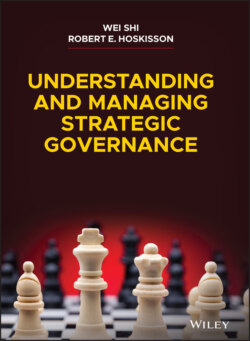Читать книгу Understanding and Managing Strategic Governance - Wei Shi - Страница 17
Board Chair
ОглавлениеTo facilitate better strategic governance, we examine the relationship between the board chair and the chief executive officer. As mentioned, the audit culture prompted by agency theory27 creates a relationship between a CEO and a control-oriented chair marked by distance and authority. This relationship does not always need to be solely control-oriented and can have a collaborative approach in which the board chair provides strategic advice. For example, when Hewlett-Packard split into two companies, Meg Whitman became CEO of Hewlett-Packard, Inc., and at the same time board chair of Hewlett-Packard Enterprise. She said in a CNBC interview: “I know the role of the chairman, and I know how it is different than the role of the CEO. The chairman is not there to run the company. The chairman [role] is to help the board be productive, help the CEO be successful.” As Whitman suggests, the chairman may play a supportive role to the CEO, providing a close source of advice and guidance.28 Also, separating the CEO and chair roles (as opposed to cases in which the CEO is also the chair), as Whitman did, may enhance CEO–board collaboration by reducing the demands on the chief executive's time, allowing the CEO to specialize in managing the firm's strategy and operations.
Although many firms still assign the chairman position to the CEO to provide a unitary authority structure,29 some scholars under the agency theory advocate for separate roles to provide better control of management.30 Having the positions as separate roles with a collaborative board chair can provide both improved strategy and better board leadership. Research supports this conclusion, finding that board chairs can provide significant value (up to 9 percent improved firm performance) through advice and counsel, legitimacy, information linkages, and preferential access to external commitments and support.31 This approach proves particularly beneficial when firms face fast-changing external environments such as in high technology firms. In essence, by providing improved strategic governance, board chairs can add significantly to firm value.
